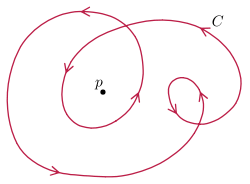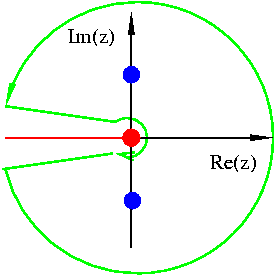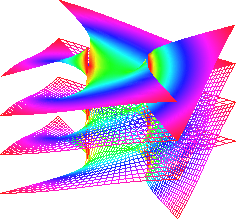Each week (or so) I will pass out a set of problems, many chosen from the text book. I will ask you write up and hand in solutions to certain of these exercises (aka, HomeWork); these will be graded and returned to you. Please be sure to check out my guidelines for writing up your HW solutions.
In order to receive audit credit for this course, you must attend all lectures and take all quizzes and exams.
| Week of | Material Covered |
Suggested Exercises | Remarks |
| Aug 24 | Sections 1.1, 1.2, 1.3, 1.4 |
Section 1.1: 9, 10, 14, 25, 27, 30 31, 33, 41, 45, 51
Section 1.2: 5, 7, 11, 13, 15, 17, 21, 25, 31, 34, 37, 41
Section 1.3: 7, 9, 13, 19, 23, 27, 35, 37, 41, 43, 45, 47
Section 1.4: 7, 14, 17, 27, 31, 33 |
|
| Aug 31 | Sections 1.5, 2.1, 2.2, 2.3, 2.4 |
Section 1.5: 3, 7, 11, 17, 25, 29, 35, 37, 45, 47-49
Section 2.1: 11, 13, 15, 27(a,c), 29(b), 33
Section 2.2: 5, 8, 13, 14, 17, 24, 27, 31, 33
Section 2.3: 5, 11, 12, 15, 21, 23, 25, 31, 35, 37
Section 2.4: 11, 13, 17, 21, 23, 29, 37, 41, 47, 49, 51 |
|
| Week of |
Material Covered | Suggested Exercises
| Remarks |
| Sep 7 | Sections 2.5, 2.6 |
Section 2.5: 3, 9, 13, 15, 17, 19, 21, 27
Section 2.6: 11, 13, 17, 33, 37
Chapter 1 Review Quiz: 1-45 (odd)
Chapter 2 Review Quiz: 1-33 (odd) |
No class Monday
Labor Day |
| Sep 14 | Sections 3.1, 3.2, 3.3 |
Section 3.1: 5, 15, 19, 21, 35
Section 3.2: 5, 11, 15, 17, 21, 25
Section 3.3: 4, 7, 13, 17, 18 |
|
| Sep 21 | Sections 3.4, 4.1 |
Section 3.4: 2, 3, 4, 7, 9, 13
Chapter 3 Review Quiz: 1, 6, 7, 8, 10, 11, 12, 13, 19
Section 4.1: 5, 7, 11, 15, 17, 19, 23, 31, 35, 43, 45, 51, 52, 55 |
|
| Sep 28 |
Sections 4.2, 4.3, 4.4 |
Section 4.2: 3, 5, 11, 17, 21, 22, 24
Section 4.3: 5, 9, 11, 12, 25, 28, 31, 39, 43
|
|
| Week of |
Material Covered | Suggested Exercises
| Remarks |
| Oct 5 | Sections 4.4, 5.1, 5.2 |
Section 4.4: 3, 5, 11, 13, 21
Chapter 4 Review Quiz: 6, 7, 8, 12, 28, 32
Section 5.1: 9, 11, 17, 19, 25, 27, 33
Section 5.2: 3, 5, 7, 9, 15, 19, 20, 23, 25, 27, 33 |
|
| Oct 12 |
Sections 5.3, 5.4 |
Section 5.3: 5, 9, 11, 17, 21, 25, 27, 29, 31
Section 5.4: 12, 15, 20 |
No class Monday
Reading Day |
| Oct 19 |
Sections 5.4, 5.5, 5.6 |
Section 5.4: 12, 15, 19, 20, 25, 27, 28
Section 5.5: 5, 9, 11, 17, 19, 21, 23, 25, 27(c), 33
Section 5.6: 8, 9, 25, 26
Chpt 5 Review Quiz: 1-19 (odd), 25, 27, 29, 34, 37 |
|
| Oct 26 | Sections 6.1, 6.2 |
Section 6.1: 13, 19, 23, 25, 27, 29, 39, 41, 43, 45
Section 6.2: 1, 4, 13, 15, 19, 25, 27, 31, 49 |
|
| Week of |
Material Covered | Suggested Exercises
| Remarks |
| Nov 2 | Sections 6.3, 6.4 |
Section 6.3: 3-21 (odd), 27, 31, 33 |
|
| Nov 9 | Sections 6.4, 6.5 |
Section 6.4: 2, 8, 9, 10, 12, 13, 21, 22, 24, 27, 29, 30, 31, 33, 34
Section 6.5: 5, 13, 16, 19, 25, 33, 37, 42 |
No class Wednesday
Veteran's Day
|
| Nov 16 | Sections 6.6 |
Section 6.6: 3, 7, 13, 15, 23, 29, 40, 43, 46, 51, 59, 61, 65 |
|
| Nov 23 |
Sections 7.1, 7.2 |
Section 7.1: 1, 3, 13, 14, 17, 19 |
No class Friday
Black Friday! |
| Nov 30 |
Sections 7.2, 7.3 |
Section 7.2: 3, 7, 11, 14, 15, 23, 25, 28, 29
Section 7.3: TBA |
Last week! |
| Week of |
Material Covered | Suggested Exercises
| Remarks |
| Dec 7 |
Finals Week |
Final Exam Monday Dec 7 |
Final Exams week |
Here are some links to articles about writing mathematics.





